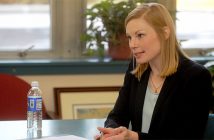
The Detroit Public School System has lost so much money that it could possibly not afford payroll after April 8 unless action is taken by state lawmakers to rectify the situation.
Steven Rhodes, who was appointed to lead DPS last week by Governor Rick Snyder last week, is asking members of the House Appropriations Committee to work quickly toward new legislation that would handle school debt, which is on the rise, saying “We can’t print money,” reports Erika Erickson for Fox2 Detroit.
“The April 8th date concerns me greatly because there is no Plan B,” Rhodes said, according to the Detroit News. “To go dark after April 8th is not an acceptable solution.”
Rhodes said the district could not take out a loan because the system cannot afford any additional debt, as it would take even more money away from the classrooms that need it in order to handle the interest payments. There is already $515 million in operating debt with a total debt exceeding $3 billion.
Legislation is currently being considered by state lawmakers which would restructure the school system and handle the debt in order to allow local control to return to schools through a $715 million rescue package. Detroit schools have been state-run since 2009, writes Emma Brown for The Washington Post. Until a decision is made concerning the package, Snyder has requested $50 million to help the schools continue to remain operational through the end of the current school year.
The rescue package would pay off the current debt and use another $200 million to create a new Detroit Community School district. The district currently spends about $1,100 per student on debt service each year, taking money away from classrooms.
Rhodes said that aside from the debt, the district would actually have a surplus of $13 million. In recent years, 150 schools have been closed and over 10,000 jobs lost, reports Ann Zaniewski for The Detroit Free Press.
The financial crisis has been an issue in the area for years, contributing to the horrendous conditions found within many of the schools. In an effort to bring a focus to the issues, which include mold, rats, cockroaches, and crumbling ceilings, teachers have held sick-outs.
In addition, the school system has trouble keeping high-quality teachers, resulting in its students performing below average on both national and state assessments. In 2015, only 6% of fourth-grade students in the city performed at or above proficiency levels in reading on the National Assessment of Educational Progress.
According to a statement released by Detroit Federation of Teachers Interim President Ivy Bailey, Detroit Association of Educational Office Employees President Ruby Newbold and Detroit Federation of Paraprofessionals President Donna Jackson, if money does not reach the school system by April 8, children will not have a school to go to and those who live under the poverty level will miss out on free school breakfasts and lunches, which many rely on as regular meals.
“The basic truth about children and school is every day you lose is a day you never get back,” said Rhodes. “We can’t have that. We have a constitutional and a moral obligation to educate our kids.”



